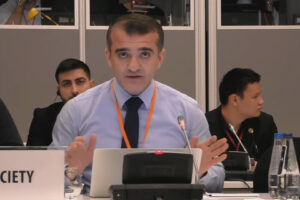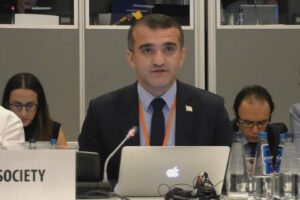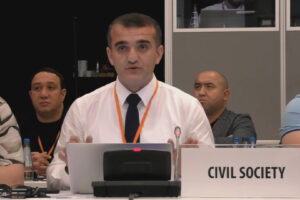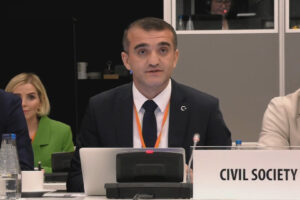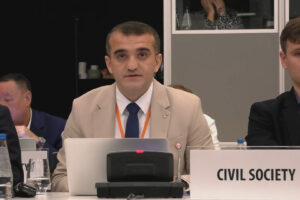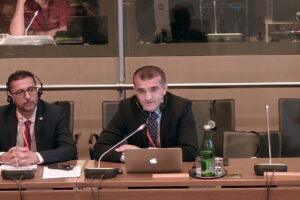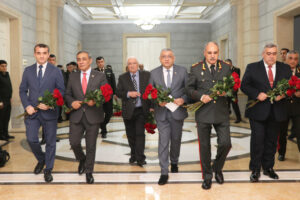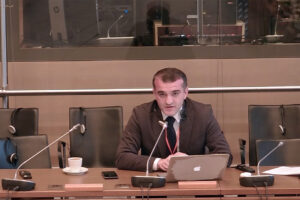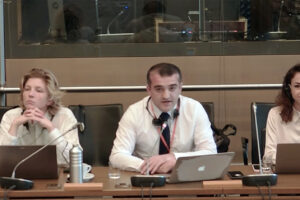MM deputies listen to civil society activists


Within the OSCE Parliamentary Assembly held in Baku on July 29 a special hearing was held on the human rights situation in Azerbaijan.
The moderator of the hearing was chairman of the OSCE PA Committee on Democracy, Human Rights and Humanitarian Affairs, Portuguese parliamentarian Isabel Santos.
She noted that this meeting is important for the Assembly. “The participation of civil society is important in all aspects of the OSCE and to this end the Parliamentary Assembly listens to the views of non-governmental organizations,” said Santos.
At the meeting three reports were presented. On the problems of civil society, the Danish organization International Media Support (IMS) Gulnara Akhundova reported. She expressed satisfaction that “the Parliament finally realized the importance of civil society and did not cancel the event and even provided an interpreter.”
She reminded that a month ago in the same hotel Fairmont NGO activists were denied a similar event for the PACE deputies.
She expressed concern over the continued existence of civil society in Azerbaijan. “Most of my partners can no longer work. The government refuses to register grants received by them. Against a number of local and foreign NGOs, including against IMS, criminal cases have been filed.
The investigative journalist Aynur Imranova could not get a small grant provided to her by our organization, because law enforcement authorities arrested her personal bank account,” continued Akhundova.
She also pointed to imprisonment of the leaders of three NGOs.
Akhundova also reported the Ministry of Justice refusal to register the grant from IMS to Azerbaijan Institute of Reporters Freedom and Safety (IRFS).
The Director of IRFS Emin Huseynov focused attention on the problems with freedom of expression.
He informed about the imprisonment of 10 journalists for the exercise of freedom of expression. Huseynov said that over the past 10 years two journalists, Elmar Huseynov and Rafig Taghi, were killed in Azerbaijan and these crimes are not disclosed.
He said all the local TV channels are state-controlled.
On the other hand, the existence of independent media requires the advertising market, which is limited due to monopolies in the economy.
Print media have low circulation and cover only the major cities of Baku and Sumgait.
Only two opposition newspapers have remained. Another independent newspaper Zerkalo suspended its release due to financial problems last month.
With regard to on-line freedom of expression, Huseynov said, from a technical point of view, access to the Internet is not blocked.
However, critics of the government are under pressure and currently six bloggers and activists of social media on the Internet are imprisoned and it promotes self-censorship.
Huseynov said that professional organizations in the field of information technology found that the capacity of some hacker group in Italy was used against opposition activists for invading their accounts in social networks and unfolding a campaign against them.
The head of the Society of Legal Protection and Education Rasul Jafarov focused on the issue of political prisoners. According to him, the prosecution is not restricted to journalists, bloggers and human rights activists, but also youth activists, opposition party members and the faithful.
He said that 11 NGOs of Azerbaijan have compiled a single list, which includes the names of 81 political prisoners, including 19 of them recognized by Amnesty International as «prisoners of conscience.”
Note that the event was attended by a large number of representatives of the pro-government NGOs.
The hearings were also observed by the Vice-speaker of the National Assembly (Parliament) Bahar Muradova, the head of the Parliamentary Committee on Human Rights Rabiyat Aslanova, and MP Azay Guliyev.
However, in contrast to the practice of previous years, with respect to the critics of the government, there was no aggression or attempts to obstruct them, and just unrestrained desire to refute the made statements was observed.
MP Guliyev, speaking, said that for the formation of objective information it is also important to invite representatives of the Azerbaijani government. “For the government to listen to criticism, it must be objective,” said Guliyev.
However, he noted that his Council of State Support to NGOs is always open to dialogue and contributes to solving the problems of concern to civil society in government.
Muradova, in connection with the moderator’s warning about the discussion time coming to an end, requested an extension of the discussion to let other representatives of the civil society in Azerbaijan express their opinion. “I am proud that we have a strong civil society and its representatives can safely express their opinions. But there are also other opinions and they also should be heard,” said Muradova.
According to her, holding OSCE PA discussions with civil society was exactly the Azerbaijani delegation’s initiative.
After that, the discussion was extended for another half an hour.
A Member of the Council on State Support to NGOs, head of the League of Labor Rights Sahib Mammadov said that the situation is not as bad as it was introduced by the speakers.
According to him, over the past 10 years only one NGO was abolished in Azerbaijan.
And after increasing penalties against NGOs for not reporting their grants one NGO was punished.
He also said that currently the Council for State Support to NGOs established a working group with the government to solve the problems with registration of grants.
Chairman NGO “Democratic Reformist Youth” Vusala Huseynli accused the OSCE Office in Baku of political discrimination of NGOs and the award of grants to the same organizations.
The head of the Constitution Research Foundation, Alimammad Nuriyev also said there is no legislation or rules about discrimination of NGOs. On the contrary, he said, discrimination is carried out by international donors. Thus, of the total grants of 22 million euros issued in recent years, 85 percent of the funds have been allocated to 22 NGOs, i.e. funds are provided to the same NGOs.
After the event, in the presence of journalists informal talks were held between Azerbaijani MPs and speakers from civil society.
Vice-Speaker Bahar Muradova expressed her willingness to always listen to them.
It was recommended to submit all the proposals to the Council for State Support to NGOs for submission to the government and parliament.
MM deputies listen to civil society activists
 29 June 2014
29 June 2014

Within the OSCE Parliamentary Assembly held in Baku on July 29 a special hearing was held on the human rights situation in Azerbaijan.
The moderator of the hearing was chairman of the OSCE PA Committee on Democracy, Human Rights and Humanitarian Affairs, Portuguese parliamentarian Isabel Santos.
She noted that this meeting is important for the Assembly. “The participation of civil society is important in all aspects of the OSCE and to this end the Parliamentary Assembly listens to the views of non-governmental organizations,” said Santos.
At the meeting three reports were presented. On the problems of civil society, the Danish organization International Media Support (IMS) Gulnara Akhundova reported. She expressed satisfaction that “the Parliament finally realized the importance of civil society and did not cancel the event and even provided an interpreter.”
She reminded that a month ago in the same hotel Fairmont NGO activists were denied a similar event for the PACE deputies.
She expressed concern over the continued existence of civil society in Azerbaijan. “Most of my partners can no longer work. The government refuses to register grants received by them. Against a number of local and foreign NGOs, including against IMS, criminal cases have been filed.
The investigative journalist Aynur Imranova could not get a small grant provided to her by our organization, because law enforcement authorities arrested her personal bank account,” continued Akhundova.
She also pointed to imprisonment of the leaders of three NGOs.
Akhundova also reported the Ministry of Justice refusal to register the grant from IMS to Azerbaijan Institute of Reporters Freedom and Safety (IRFS).
The Director of IRFS Emin Huseynov focused attention on the problems with freedom of expression.
He informed about the imprisonment of 10 journalists for the exercise of freedom of expression. Huseynov said that over the past 10 years two journalists, Elmar Huseynov and Rafig Taghi, were killed in Azerbaijan and these crimes are not disclosed.
He said all the local TV channels are state-controlled.
On the other hand, the existence of independent media requires the advertising market, which is limited due to monopolies in the economy.
Print media have low circulation and cover only the major cities of Baku and Sumgait.
Only two opposition newspapers have remained. Another independent newspaper Zerkalo suspended its release due to financial problems last month.
With regard to on-line freedom of expression, Huseynov said, from a technical point of view, access to the Internet is not blocked.
However, critics of the government are under pressure and currently six bloggers and activists of social media on the Internet are imprisoned and it promotes self-censorship.
Huseynov said that professional organizations in the field of information technology found that the capacity of some hacker group in Italy was used against opposition activists for invading their accounts in social networks and unfolding a campaign against them.
The head of the Society of Legal Protection and Education Rasul Jafarov focused on the issue of political prisoners. According to him, the prosecution is not restricted to journalists, bloggers and human rights activists, but also youth activists, opposition party members and the faithful.
He said that 11 NGOs of Azerbaijan have compiled a single list, which includes the names of 81 political prisoners, including 19 of them recognized by Amnesty International as «prisoners of conscience.”
Note that the event was attended by a large number of representatives of the pro-government NGOs.
The hearings were also observed by the Vice-speaker of the National Assembly (Parliament) Bahar Muradova, the head of the Parliamentary Committee on Human Rights Rabiyat Aslanova, and MP Azay Guliyev.
However, in contrast to the practice of previous years, with respect to the critics of the government, there was no aggression or attempts to obstruct them, and just unrestrained desire to refute the made statements was observed.
MP Guliyev, speaking, said that for the formation of objective information it is also important to invite representatives of the Azerbaijani government. “For the government to listen to criticism, it must be objective,” said Guliyev.
However, he noted that his Council of State Support to NGOs is always open to dialogue and contributes to solving the problems of concern to civil society in government.
Muradova, in connection with the moderator’s warning about the discussion time coming to an end, requested an extension of the discussion to let other representatives of the civil society in Azerbaijan express their opinion. “I am proud that we have a strong civil society and its representatives can safely express their opinions. But there are also other opinions and they also should be heard,” said Muradova.
According to her, holding OSCE PA discussions with civil society was exactly the Azerbaijani delegation’s initiative.
After that, the discussion was extended for another half an hour.
A Member of the Council on State Support to NGOs, head of the League of Labor Rights Sahib Mammadov said that the situation is not as bad as it was introduced by the speakers.
According to him, over the past 10 years only one NGO was abolished in Azerbaijan.
And after increasing penalties against NGOs for not reporting their grants one NGO was punished.
He also said that currently the Council for State Support to NGOs established a working group with the government to solve the problems with registration of grants.
Chairman NGO “Democratic Reformist Youth” Vusala Huseynli accused the OSCE Office in Baku of political discrimination of NGOs and the award of grants to the same organizations.
The head of the Constitution Research Foundation, Alimammad Nuriyev also said there is no legislation or rules about discrimination of NGOs. On the contrary, he said, discrimination is carried out by international donors. Thus, of the total grants of 22 million euros issued in recent years, 85 percent of the funds have been allocated to 22 NGOs, i.e. funds are provided to the same NGOs.
After the event, in the presence of journalists informal talks were held between Azerbaijani MPs and speakers from civil society.
Vice-Speaker Bahar Muradova expressed her willingness to always listen to them.
It was recommended to submit all the proposals to the Council for State Support to NGOs for submission to the government and parliament.
 @
@










